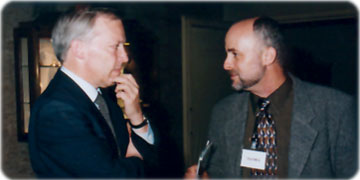 |






|
 |
 |
Executive Summary
Page 1 | Page 2
| Page 3 | Page 4
Beyond Technology: The Shape of Globalized Societies
What are the key rules of the game in future societies, and which actors
shape them?
Who are the likely winners and losers, and why?
What element of social change (e.g. globalization, individualization,
regionalization) is likely to be most important?

Joop de Vries, David Brin.
Mr. Joop de Vries, Executive Director of RISC - Future in Paris, France,
opened the discussion on social changes not driven by technology. Although
technological change will have a profound impact on our lives and lifestyles,
I would not regard technology as the "key actor".
The concept of "actor" implies action, which in turn implies that there
is a degree of freedom and choice. In that sense, 'the people' collectively
are the actors shaping the 'rules of the game', not the leaders. People
will decide how new rules will be developed and in modern democracies,
the leaders follow.
When we refer to winners and losers, we have to define what game we are
playing. Looking at societies and individual people - in contrast to countries
or companies - the situation is less straightforward. At the macro-level,
winners are those who have challenging jobs, are part of networks, are
on-line, and financially well-off. Losers are the people with low skills
and little money, and who are afraid of change. However, for society as
a whole the main question is whether people see themselves as winners
or losers. They apply their own criteria, which only in part are connected
with the 'winners and losers' criteria at the macro-level.
Summary of Presentation
Rabbi Walter Homolka discussed the
role of non-governmental organizations (NGOs) in solving global problems.
NGOs clearly have various positives sides: they challenge wrong, demand
change, they can offer alternatives - very often NGOs are addressing political
issues where their expertise is sought. But they also have serious drawbacks
that limit their effectiveness at the international level:
1. NGOs are very unstable.
2. NGOs are heavily dependant not only on public appreciation but also
on media attention.
3. NGOs are single-issue-oriented.
4. NGOs are stuffed not so much by researchers and analysts but by believers.
5. NGOs suffer from quite insufficient organizational structures.
6. NGOs need an enemy.
7. NGOs have no democratic legitimacy.
He added, "I would say there is no other process than politics and people
that elect their representatives that than can take of the kind of framework
we need to go into the future. And I therefore would urge to discuss how
we could reach a reformation of the political process."
Summary of Presentation
Professor Kriengsak Chareonwongsak
of the Institute of Future Studies for Development in Bangkok, Thailand,
gave an Asian perspective on these issues. "The picture of industrialised
society as it will be in the next 10 years I would like to paint, is a
set of complex, overlapping and related observations of the future. There
will be five critical, non-technological forces which will shape industrialized
societies over the next 10 years:
1. Demography
2. Natural resources and the environment
3. Values
4. World order
5. Global interaction."
Society in 2010 will comprise both tension and co-operation at all levels,
internationally, nationally as well as socially. Changes will take place
gradually, step by step. Some of the potential tensions would need considerable
adjustments and people will need to be more adaptable as the speed of
change increases. And it will be a very challenging society to live in.
Summary of Presentation
In the discussion that followed, Dr. Hans Fleisch offered a point-by-point
rebuttal of Rabbi Homolka's comments
on NGOs. He concluded, "What I see as a solution: We should think in three
sectors: the governmental sector, the for-profit private sector, and the
third sector which includes NGOs and foundations. They are driving forces
of the future. Those who partner with institutions from other sectors
will be the winners and the players of the future. And those countries
will win where there is a good partnership between the government and
the non-governmental including the private for-profit sector. This three-partnership-model
and partnership, in principle, will solve many problems."
Steven O'Connor saw potential solutions
for Western Europe in the energetic capitalism in Central and Eastern
Europe, while Jude Milhon offered the idea
of benign conspiracies - non-governmental non-organizations that link
people world-wide who are interested in particular issues. Connectivity
has the potential to solve democracy's problem of scale. Dr. Gregory Stock
said that in this context, supranationalism to eliminate conflict is probably
a bad idea, and that the only way societies learn is through trial, error,
and adaptation. Yoshimasa Hayashi, a member of the upper house of Japan's
parliament, added that it is important
for government to reach down to smaller scales in order to build acceptance
among the population.
Page 1 | Page 2
| Page 3 | Page 4
|
 |
